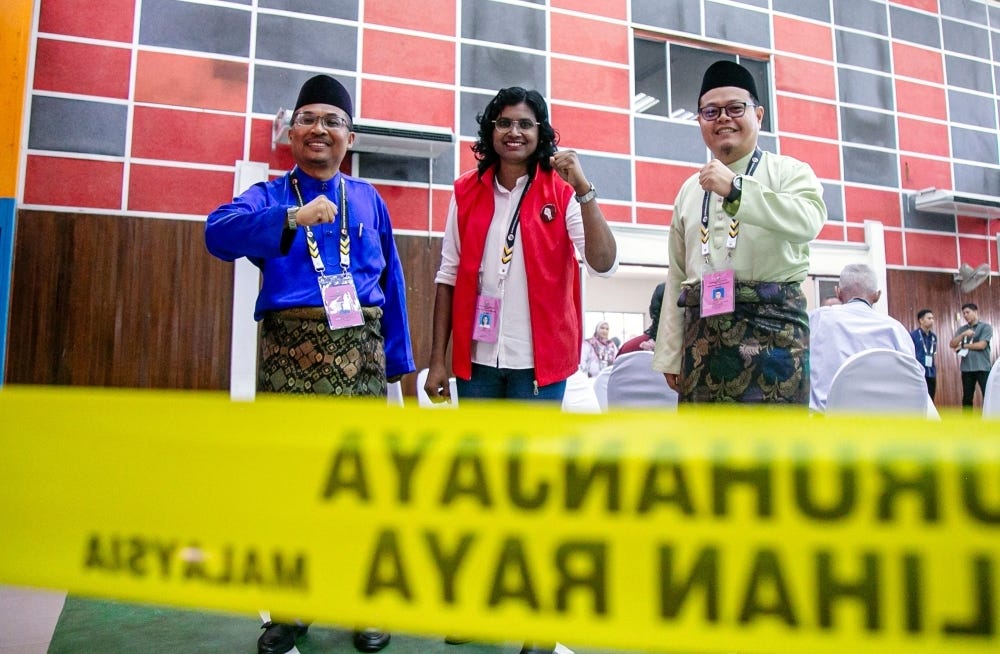
Murray Hunter
Undermining democratic integrity:Development promises in the midst of Ayer Kuning by-election
P Ramasamy
Apr 17, 2025

It is both disingenuous and troubling for Perak Menteri Besar Saarani Mohamad to claim that the approval of development projects—such as the traffic dispersal system in Ayer Kuning—was merely a continuation of the late state assemblyman Ishsam Shahruddin’s wishes.
While I do not doubt Shaarani’s sincerity, invoking the memory of a deceased leader to justify these announcements on the eve of a by-election smacks of political opportunism.
What is more disappointing is the conduct of the Minister of Housing and Local Government, Nga Kor Ming. Regardless of his intentions, Nga should have exercised greater restraint and refrained from announcing these projects in a constituency heading into a by-election.
The moral responsibility of his office demands a higher standard—particularly when it concerns the optics and ethics of fair electoral conduct.
Prime Minister Anwar Ibrahim, who has consistently spoken about transparency and clean governance under the “Madani” banner, only worsened the situation by defending Nga’s actions.
This defense not only undermines public trust but also sets a troubling precedent.
Shaarani’s emotional appeal, citing a promise made to the late assemblyman, cannot be accepted as justification.
In fact, this narrative is eerily reminiscent of what happened during the Kuala Kubu Bharu by-election last year, when similar tactics were deployed.
The ruling Pakatan Harapan-led government must be honest and uphold the spirit of democratic integrity.
It is simply unacceptable for ministers or government-linked politicians to make development announcements during election periods.
These moves can easily be perceived as attempts to unduly influence voters and give the government’s candidate an unfair advantage, thus denying a level playing field to opposition or independent candidates.
Anwar’s public defense of such practices casts serious doubts on his commitment to reform and institutional integrity. In countries where election commissions are strong and independent, both Nga and Anwar would likely face censure for blurring the lines between governance and campaigning.
As for Shaarani, using sentiments tied to the late Ishsam Shahruddin as a political justification borders on exploiting sympathy for electoral gain. Such behavior would invite disciplinary scrutiny in a truly accountable system.
Regrettably, our Election Commission (EC) continues to operate as a toothless entity, seemingly beholden to the executive. While its primary role is to oversee and conduct elections, it has failed to act decisively against blatant violations of fair election practices. The EC’s inability—or unwillingness—to intervene contributes to a worsening culture of impunity.
This pattern of exploiting development projects during election season has become normalized under successive governments. While the opposition can raise its voice, it lacks meaningful recourse in the face of entrenched practices and weak enforcement mechanisms.
It is deeply ironic that all this unfolds under a government that claims to champion reform, transparency, and governance under the “Madani” framework. What we witness, instead, is the erosion of public trust, institutional credibility, and electoral fairness.
What a shame. So much for the rhetoric of reform.
By P. Ramasamy, Chairman, Urimai
Apr 17, 2025

It is both disingenuous and troubling for Perak Menteri Besar Saarani Mohamad to claim that the approval of development projects—such as the traffic dispersal system in Ayer Kuning—was merely a continuation of the late state assemblyman Ishsam Shahruddin’s wishes.
While I do not doubt Shaarani’s sincerity, invoking the memory of a deceased leader to justify these announcements on the eve of a by-election smacks of political opportunism.
What is more disappointing is the conduct of the Minister of Housing and Local Government, Nga Kor Ming. Regardless of his intentions, Nga should have exercised greater restraint and refrained from announcing these projects in a constituency heading into a by-election.
The moral responsibility of his office demands a higher standard—particularly when it concerns the optics and ethics of fair electoral conduct.
Prime Minister Anwar Ibrahim, who has consistently spoken about transparency and clean governance under the “Madani” banner, only worsened the situation by defending Nga’s actions.
This defense not only undermines public trust but also sets a troubling precedent.
Shaarani’s emotional appeal, citing a promise made to the late assemblyman, cannot be accepted as justification.
In fact, this narrative is eerily reminiscent of what happened during the Kuala Kubu Bharu by-election last year, when similar tactics were deployed.
The ruling Pakatan Harapan-led government must be honest and uphold the spirit of democratic integrity.
It is simply unacceptable for ministers or government-linked politicians to make development announcements during election periods.
These moves can easily be perceived as attempts to unduly influence voters and give the government’s candidate an unfair advantage, thus denying a level playing field to opposition or independent candidates.
Anwar’s public defense of such practices casts serious doubts on his commitment to reform and institutional integrity. In countries where election commissions are strong and independent, both Nga and Anwar would likely face censure for blurring the lines between governance and campaigning.
As for Shaarani, using sentiments tied to the late Ishsam Shahruddin as a political justification borders on exploiting sympathy for electoral gain. Such behavior would invite disciplinary scrutiny in a truly accountable system.
Regrettably, our Election Commission (EC) continues to operate as a toothless entity, seemingly beholden to the executive. While its primary role is to oversee and conduct elections, it has failed to act decisively against blatant violations of fair election practices. The EC’s inability—or unwillingness—to intervene contributes to a worsening culture of impunity.
This pattern of exploiting development projects during election season has become normalized under successive governments. While the opposition can raise its voice, it lacks meaningful recourse in the face of entrenched practices and weak enforcement mechanisms.
It is deeply ironic that all this unfolds under a government that claims to champion reform, transparency, and governance under the “Madani” framework. What we witness, instead, is the erosion of public trust, institutional credibility, and electoral fairness.
What a shame. So much for the rhetoric of reform.
By P. Ramasamy, Chairman, Urimai